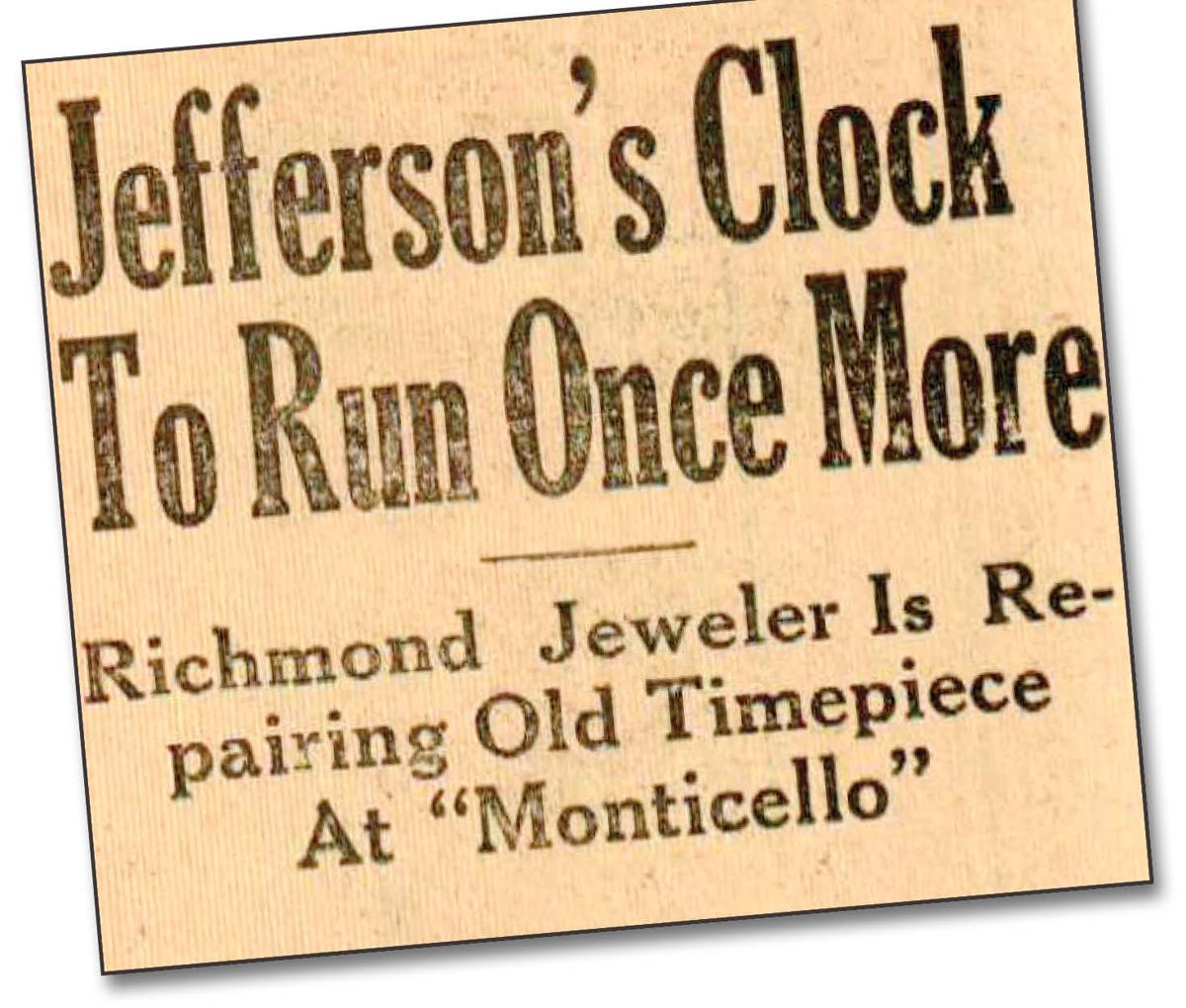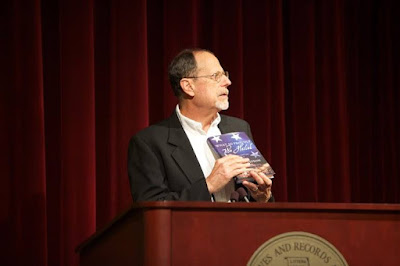Saving Monticello: The Newsletter
The latest about the book, author
events, and more
Newsletter Editor - Marc Leepson
Volume XV, Number 1 January
1, 2018
ONE GREAT
CLOCK: A little over eighty years ago, on December 15, 1937, to be
exact, the Charlottesville Daily Progress
newspaper reported that a Richmond jewleler named Otto Frederick
Ostergren had repaired Thomas Jefferson’s famed seven-day clock. Ostergren, the
article said, got the clock working properly for the first time since the late
1850s during the time when Uriah Phillips Levy owned Monticello
“Jefferson may have been a novice, but he evidently knew
enough about clocks to design a good one that had but one major fault,” the
newspaper reported in 1937. “This fault was in the striking mechanism, which if
it ever got out of order, would stop the entire complicated apparatus. As a
result, the great clock has run but a third of the time during the 130 years it
has been at Monticello.”
Ostergren, the article went on to say, simplified the clock’s
mechanism “to take care of the major difficulties.” Once more, it said, “the
people of Charlottesville will hear the doleful tolling of the hours as they
did back in the days when the clock was running and the striking hammer
resounded on the huge disk placed up in the roof. At times, the tolling would
continue for hours, and then someone would have to climb out on the roof and
set the apparatus right.”

Jefferson designed the one-of-a-kind clock, and sent his
plans to a Philadelphia clockmaker named Peter Spruck to build. Spruck created
it with the help of his apprentice Robert Leslie in 1793. It wasn’t installed
in Monticello’s Entrance Hall, though, until 1805 when Jefferson was president.
The Great Clock has remained there ever since—one of only a handful of items
that has been in Monticello continuously from Jefferson’s time to today.
I first
mention the Great Clock in Saving
Monticello in the section on the brief (1831-34) ownership of Monticello by
the eccentric Charlottesville pharmacist James Turner Barclay. He bought the
place from Jefferson’s daughter Martha and her son Thomas Jefferson Randolph
after they had sold virtually all the furniture and furnishings in the years
following Jefferson’s death in 1824.
According to his daughter, Barclay bought special tools to
repair the clock, which, she said, had been broken for “many years.”
Barclay signed a contract to sell Monticello to Uriah Levy
in 1834, but the sale was delayed for two years when the parties had a dispute
over what exactly would convey to Levy. The contract called for Levy to receive
Monticello and its “appurtenances” and 230 acres of land. Barclay would keep
the houses’ valuable pier mirrors and the seven-day clock.
However, a land survey revealed that Barclay had sold off
all but 218 of Monticello’s acres. So Levy asked Barclay to annul the initial
contract, which he did. The parties wrote a new one in which Barclay dropped
the price to $2,500 and, according to Levy, threw in the mirrors and clock. Barclay
disagreed with that and legal wrangling (a lawsuit and a counter suit) ensued.
It ended in 1836 when the parties settled the lawsuits and Uriah Levy took
possession of the house—including the Great Clock and the mirrors.

Uriah Levy, a U.S. Navy lieutenant when he bought
Monticello, spent most of his time at sea, in the 1850s. His caretaker at
Monticello, Joel Wheeler, lived in and ran Monticello, but didn’t exactly
maintain the place well.
That included the Great Clock, which was in the mid-1850s
was unused and in bad shape. “Dust and rust corrode the silent wheels,” a
visitor reported in 1856. According to the Richmond clockmaker Frederick
Ostergren the Great Clock would stay in that condition until 1937.
You can read a full description of the Great Clock on the Thomas
Jefferson Foundation’s online Thomas Jefferson Encyclopedia at http://bit.ly/JeffGreatClock
To read the Daily Progress article, go to http://bit.ly/ProgressClock
EVENTS: Here
are my January speaking events. For info on my new book, Ballad of the Green Beret, please go to http://bit.ly/GBBallad
- · Thursday, January 4 – Talk on Saving Monticello and book signing for the Leesburg Rotary Club, Leesburg, Virginia
- · Tuesday, January 9 – 12:30 p.m. talk on Francis Scott Key and “The Star-Spangled Banner” at the Jewish Community Center of Northern Virginia. Open to the public. For info, call 703-537-3068 or go to http://bit.ly/jccnvKey
- · Thursday, January 11 – Talk on Flag: Saving Monticello and book signing at the monthly meeting of the Falls Church (Va.) DAR chapter.
- · Thursday, January 25 – 1:00 p.m. talk on What So Proudly We Hailed: Francis Scott Key: A Life and book signing for Montgomery County (Md.) Oasis, 7125 Democracy Blvd. Bethesda. Open to the public. For info, call 301-469-6800, ext. 211.

If you’d like to arrange an event
for Saving Monticello—or for any of
my other books, including Ballad of the
Green Beret—please email me at marc527psc@aol.com
For details on other upcoming
events, go to http://leepsoncalendar.blogspot.com
GIFT IDEAS:
Want a personally autographed, brand-new paperback copy of Saving Monticello? Please e-mail me at Marc527psc@aol.com I also have a few
as-new, unopened hardcover copies.
Or go to marcleepson.com/signedbooks.html to order copies through my local
bookstore, Second Chapter Books in Middleburg, Virginia. We also have copies of
Desperate Engagement, Flag, Lafayette, and What So
Proudly We Hailed, and Ballad of the
Green Beret.


